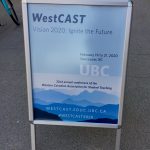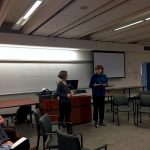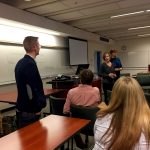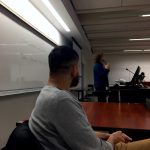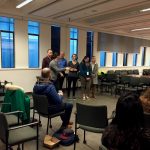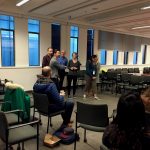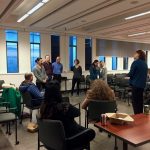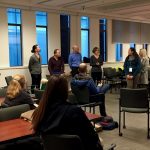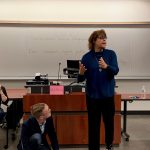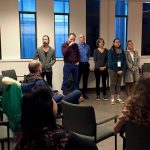Western Canadian Association for Student Teaching (WestCAST) Conference
Public Statements and Teacher Candidate Reactions
The Transformational Inclusive Pedagogical Practices (TIPP) Project Collective had the pleasure of presenting at the 32nd Annual WestCAST Conference on Thursday, February 20th.
TIPP Collective members performed one of its scenarios called “Public statements require public responses”. Due to the casual atmosphere of this workshop, conference attendees trickled into the presentation space at various times, which led spontaneously to the scenario being performed twice before the small group discussions took place. Performing the scenario twice had unexpected pedagogical benefits in that latecomers were able to engage with the entirety of the scene (rather than only a part of it), and other audience members were able to have the scene replayed for a more critical viewing. Interestingly, interpersonal dynamics among TIPP Collective characters were heightened during the second performance of this uncomfortable and thought-provoking university classroom scenario.
There were about 30 conference attendees at the workshop, many of whom offered insights and interpretations of the scenario with the group during both small- and large-group discussion. One audience member shared their thoughts on the ways in which this scenario extends to other classroom situations where the intersectionality of student identities is considered. For teachers, the tension associated with the responsibility of addressing problematic situations in classrooms, without shutting down discussion, was expressed by a number of conference attendees as being represented accurately in the scene. Audience members wondered aloud about the role of social media in potentially escalating conflicts beyond the physical space of the university into the digital realm. The TIPP scenario and related discussions provided Collective and audience members with ‘food for thought’ while enjoying their conference lunch.
Some strategies conference attendees offered in relation to the performed scenario included establishing proactive “ground rules” for classroom conduct and discussion at the beginning of a course so that students can be held accountable to these expectations during difficult conversations. Paying attention to body language was argued by another audience member to signal to teachers when students are feeling uncomfortable with, or isolated and distracted from, peer comments during classroom discussion. In a practicum context, teacher candidates were encouraged to find safe people in their school (principals and other teachers) who can support them when difficulties arise. Throughout these kinds of actions, transformational and inclusive pedagogical practices can begin to unfold within post-secondary and K-12 school classrooms.
Although brief, this workshop was well received and generated many ideas and emotions for WestCAST attendees. The TIPP Collective would like to extend gratitude to the organizing committee of WestCAST, and particularly Associate Dean Marianne McTavish, for featuring this initiative in this year’s conference program.
For more information, please visit the following websites:
The TIPP Project’s parent site: educ.ubc.ca/tipp
WestCAST 2020: westcast.educ.ubc.ca
